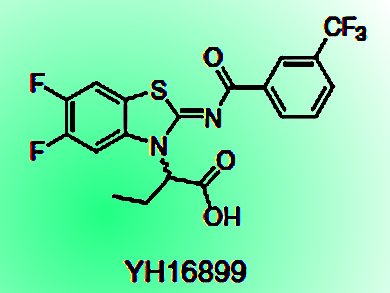The enzyme lysyl-tRNA synthetase (KRS) catalyses an essential step for protein synthesis. In cancer cells, however, KRS binds to the laminin receptor (LR), a protein which enables malignant cells to metastasize, namely to invade distant organs. By associating to LR, KRS prevents its degradation and, thus, it promotes cancer progression.
Dae Gyu Kim, Seoul National University, South Korea, and colleagues developed YH16899, a drug which inhibits KRS-LR interactions, thereby suppressing the development of metastasis in tumor-bearing mice. The new compound, (2-(5,6-difluoro-2-{[3-(trifluoromethyl)benzoyl]imino}benzo[d]thiazol-3(2H)-yl)butanoic acid (pictured), prevented KRS from binding to LR and it affected only minimally KRS catalytic activity. As a consequence, it did not block protein synthesis in normal cells. In addition, since normal cells have lower LR levels than the malignant ones, the new drug caused only few side effects on healthy tissues.
YH16899 may thus be a promising tool to control metastasis in a selective way.
- Chemical inhibition of prometastatic lysyl-tRNA synthetase–laminin receptor interaction,
Dae Gyu Kim, Jin Young Lee, Nam Hoon Kwon, Pengfei Fang, Qian Zhang, Jing Wang, Nicolas L Young, Min Guo, Hye Young Cho, Ameeq Ul Mushtaq, Young Ho Jeon, Jin Woo Choi, Jung Min Han, Ho Woong Kang, Jae Eun Joo, Youn Hur, Wonyoung Kang, Heekyoung Yang, Do-Hyun Nam, Mi-Sook Lee, Jung Weon Lee, Eun-Sook Kim, Aree Moon, Kibom Kim, Doyeun Kim, Eun Joo Kang, Youngji Moon, Kyung Hee Rhee, Byung Woo Han, Jee Sun Yang, Gyoonhee Han, Won Suk Yang, Cheolju Lee, Ming-Wei Wang, Sunghoon Kim,
Nature Chem.Biol. 2013.
DOI: 10.1038/nchembio.1381




